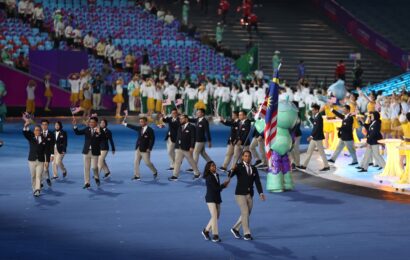
A slightly belated Happy New Year, and an opportunity to share what’s on the horizon for our sport.
We ended 2024 on a high note with the successful first edition of the combined Men’s and Women’s World Team Championships in Hong Kong, China. Congratulations to Egypt for retaining both men’s and women’s titles; and huge thanks to the Hong Kong Football Club and Chair of the Organising Committee David Cross for being an exceptional host. May I also welcome our two new WSF Vice-Presidents Mark Pagon (USA) and David Mui (HKG) to the WSF Board and thank retiring Vice-Presidents Pablo Serna and Karim Darwish for their contributions over the last term.
For WSF 2024 was another year of steady progress across most aspects of our strategy and operations, giving the organisation a more sustainable base from which to tackle our increased responsibilities as a new sport on the Olympic Programme. On 1st January WSF became an Associate Member of ASOIF (Association of Summer Olympic Sports), which brings more support, greater responsibilities and accountability, though no additional funding. At the same time, we start 2025 with four new Full Members of WSF as we welcome back Austria and welcome Indonesia, Thailand and Turkey to the WSF family, bringing us to 92 Full Members compared with 81 four years ago. Still plenty of growth potential as we look to review WSF’s membership structure/offer over the next year.
The AGM in Hong Kong reported on progress with WSF’s strategy 2022-25. Three years ago, we thought it was quite an ambitious strategy for a small team of staff; but much of it has been achieved as we approach its re-fresh later this year. We’d like to understand your thoughts on our next set of strategic priorities through to the end of 2028, so this will be the focus of this year’s annual survey to MNFs. In the meantime, we still have plenty on our 2025 workplan to deliver in year four of the current strategy, some of which are highlighted below.
On the sport side, after many years in discussion, an inaugural World U23 Championship will take place in Karachi (6th-10th April) thanks to the generous support of the Pakistan Squash Federation. If it goes well, and with Member support the aim is for this to be a biennial event in alternate years to the World University Championships, the combination of which helps to support player transition between junior and senior levels.
The World Junior Championships 2025 returns to Egypt after 20 years. The Black Ball Sporting Club in Cairo will be a fabulous venue, taking place 21st July to 1st August. This will be the second edition featuring both men’s and women’s junior team events. The plan is to also launch the new World Junior Rankings a couple of months before the Junior Championships, delivered as part of WSF’s partnership with Squash Levels.
There are two other major events on the 2025 calendar. The World Games in Chengdu, 7th to 17th August are the global multi-sport games, endorsed by the IOC, for sports not permanently on the Olympic Programme. Thus, it is important to showcase our best players on the world stage in China. 2025 concludes with the WSF World Cup taking place in December in Chennai. This is a mixed team event played as best of five games to seven points. It promises to be a great spectacle and lots of fun following the phenomenal success of the inaugural edition in Chennai in mid-2023.
On the Olympic front, we anticipate the announcement of the LA28 venue at the end of Q1 and the early launch of the first LA28 ticketing campaign later this year. During Q1 the IOC will start discussions with us to determine the athlete qualification process. We will also need to make some revisions to the Rules of Squash and to our Championship Regulations, used by LA28 and the IOC to manage the sport competition in Los Angeles. As the deadline for such revisions is 30th June this year, we plan to hold an on-line WSF Extraordinary General Meeting in mid-June to consult Members on major changes. Formal notice will be issued in mid-Feb.
As part of a re-branding exercise, in the next few months we will also launch WSF’s new logo (the concept shared in Hong Kong last month), new website and adoption of the ‘dot sport’ e-mail domain, the latter also available for Member Federations. More on these very soon.
As mentioned earlier, as a new sport on the Olympic Programme we are expected to become more aligned with the IOC’s priorities, driven by the 15 recommendations in its Agenda 2020+5. This is why you’ve seen an acceleration of WSF activity in areas such as player wellbeing / safeguarding, environmental sustainability, gender equality and digitisation. Whilst our larger MNFs are already advanced in these areas, as a sport we must increasingly encourage and support more universal implementation of policies across these areas. Likewise, good governance is a fundamental expectation for all International Federations, and as a new sport on the Olympic Programme the WSF will undergo its first formal governance audit by ASOIF in Q4 of this year. This is likely to drive some further changes to WSF’s governance framework over the next year, requiring support from Member Federations.
Partnerships will become increasingly important if we are to serve our sport effectively over the next 4 years. I’m a firm believer that sharing is a powerful force underpinning effective partnerships and delivery, and conference delegates agreed we can do more to facilitate the development of our sport and its communities through greater sharing of expertise, resources and influence across the sport. This is also part of our 2025 workplan. Partnership and sharing of best practice and resources also underpins the rationale behind the proposed new joint WSF-PSA Foundation, Squash United that should roll out over the next few months.
There can be no doubt that squash’s elevation to the Olympic Programme has boosted the sport in many ways and fuelled a new wave of growth potential. One of the priorities for the new WSF Board is to source new funding to boost the capacity of the WSF office and enable it to meet its increased obligations and deliver its strategic projects a bit quicker.
In wrapping up, on behalf of the Board and WSF Office I would like to reiterate our thanks to colleagues in Continental and National Federations, to our WSF Commission Chairs and members for your continued support and contribution to the sport’s achievements and progress. We appreciate the part each and every one of you makes to the sport’s progress.
Together, let’s make 2025 an extraordinary year for squash.
Zena Wooldridge OBE
President, World Squash





















